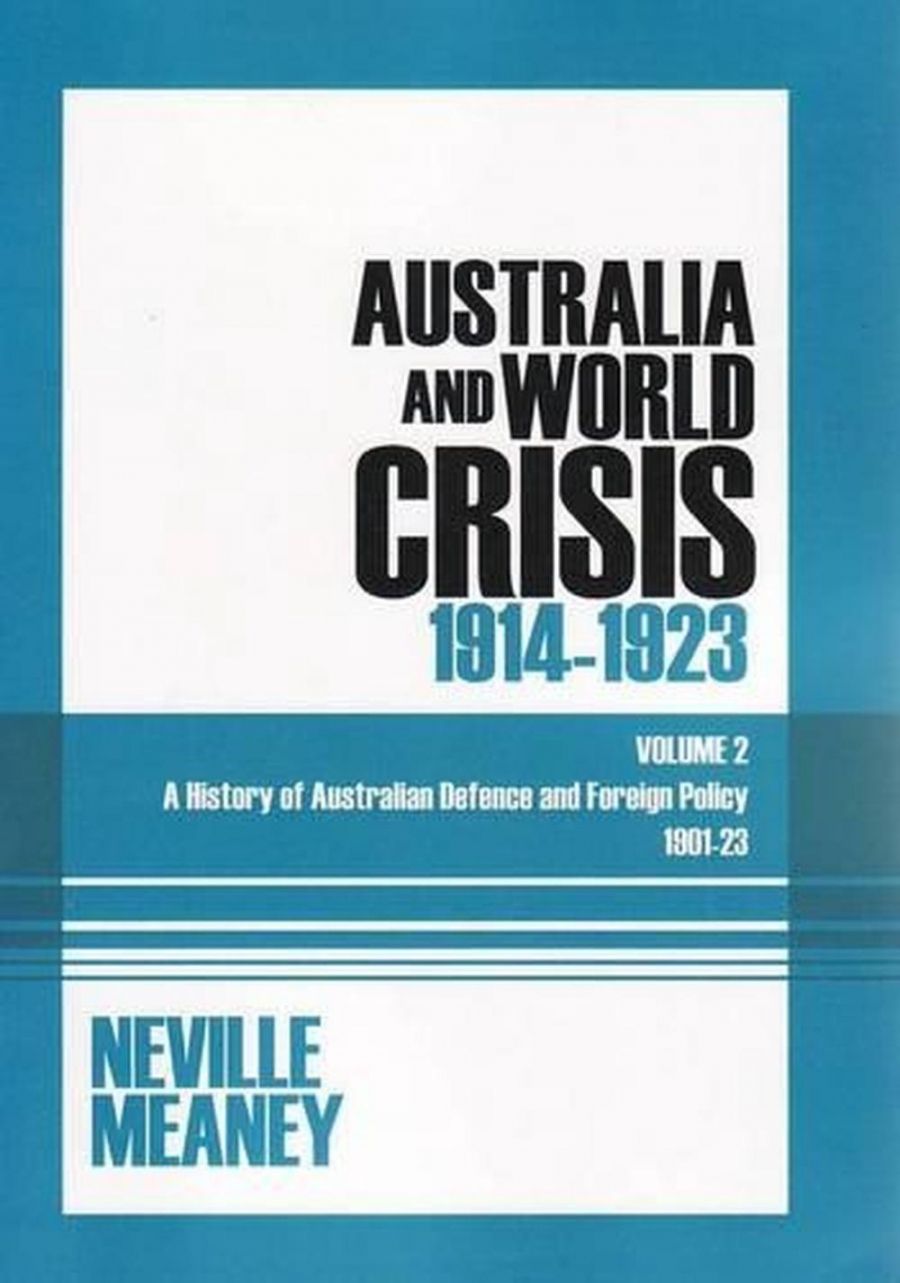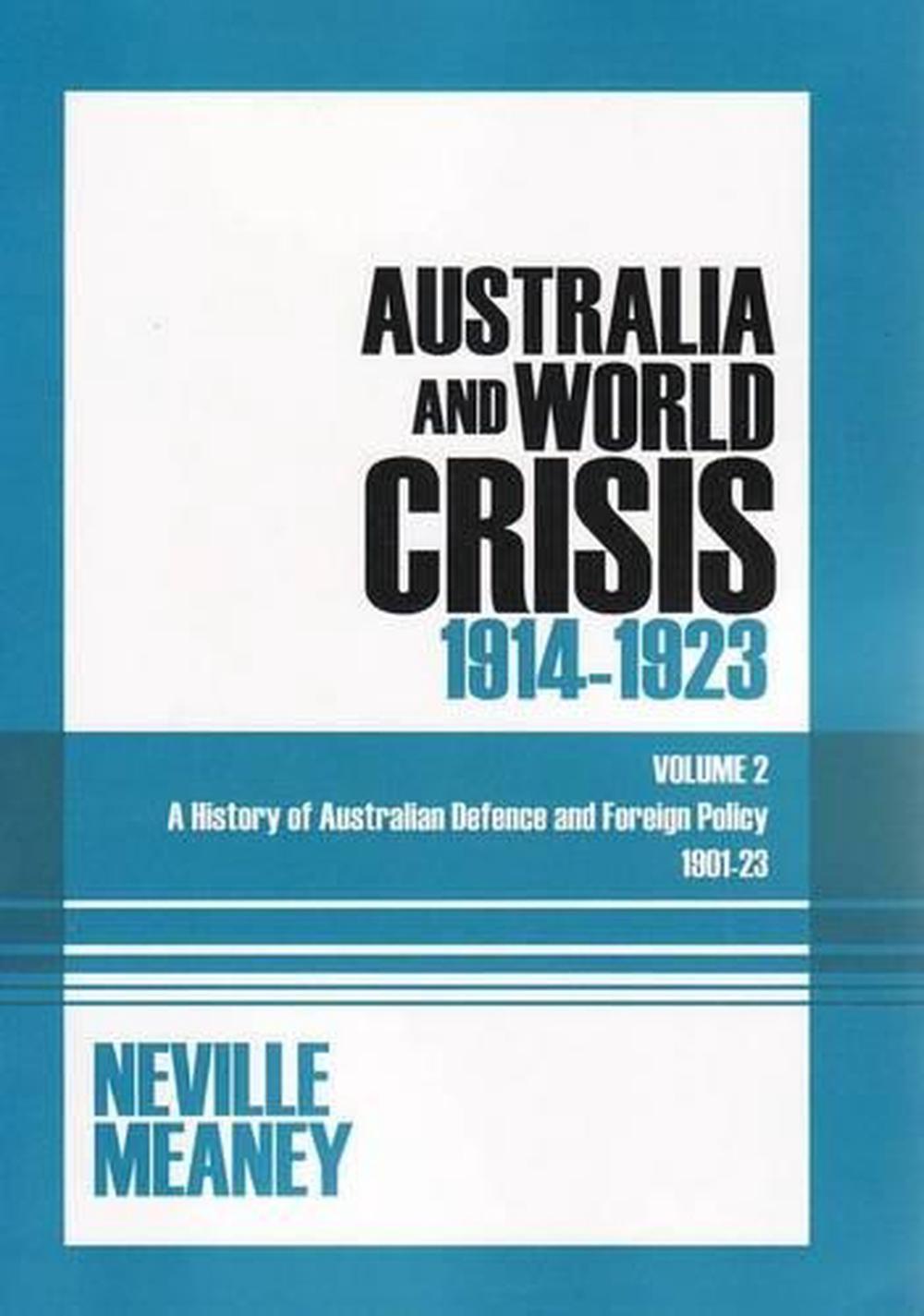
- Free Article: No
- Contents Category: History
- Review Article: Yes
- Article Title: Tricky business
- Article Subtitle: A major new history of Australia in the Great War
- Online Only: No
- Custom Highlight Text:
War aims to achieve essentially political objectives through the use of organised violence. It is a tricky business because the means we try to use – the violence itself and the way we organise and inflict it – exert a powerful fascination which often overshadows the objectives we have set ourselves. We so easily focus on the fighting itself and forget why we are doing it. Afghanistan today shows how the resulting muddle can distort contemporary strategic choices. But it also affects our view of past wars, which matters because past wars so strongly shape the way we see ourselves today. We tell and retell the stories of our soldiers’ heroism and tragedy, but hardly consider what they were fighting to achieve. As a result, we come to see our military history as a series of heroic exploits shorn of strategic purpose, so that war’s violence and sacrifice becomes self-validating; an end in itself. Almost, as Peter Weir suggested, like a sport.
- Book 1 Title: A History of Australian Defence and Foreign Policy 1901–23
- Book 1 Subtitle: Volume Two – Australia and World Crisis, 1914 – 1923
- Book 1 Biblio: Sydney University Press, $80 pb, 551 pp
- Book 1 Cover Small (400 x 600):

Of course, this view is false. War is not a force of nature but an act of policy. The nature and scale and terrible cost of Australia’s commitment to World War I resulted from deliberate and specific policy choices by Australian leaders, backed by Australian voters. Their choices were guided by a strong, clear and at times urgent sense of Australia’s distinct strategic interests. Those choices were hotly debated at the time, and some or many of them may well have been wrong. But the decisions which sent 350,000 Australians to war and 60,000 to their deaths were made by Australians for what they believed to be good and clear Australian reasons. We simply cannot understand Australia’s World War I without understanding these decisions, the people who made them and the ideas that drove them. We can hardly understand our present strategic choices either, because the ideas that drove Australia’s decisions in 1914 still influence Australian strategic policy today.
This is the story that Neville Meaney tells. Australia and World Crisis, 1914–1923 sets out to explain why Australia went to war and stayed at war, how we shaped our involvement, and what we achieved. It is by far the most comprehensive strategic history of Australia’s war so far written, and it should transform our understanding of this pivotal crisis in our history. It is a very important book.
The basic story is simple enough. In the decades before 1914, Britain’s power waned in the Pacific, while Japan grew stronger. Australians feared that if Japan was not constrained by Britain’s navy, it would threaten Australia. These fears sharpened when war broke out in Europe. Australians believed that if Britain was defeated, its fleet would be disbanded and Australia left defenceless. That posed a deep dilemma for Australian leaders. On the one hand, they felt impelled to do all they could to support Britain in Europe and thereby improve the chances that the Royal Navy would continue to provide Australia’s ultimate defence. On the other hand, they felt driven to maximise Australia’s own local defence capabilities, so that if Britain fell we would be able to resist Japan ourselves. Australia’s policy throughout World War I struggled to balance these conflicting imperatives.
In bare outline this story is not new, but the scale and range of Meaney’s work provide unprecedented depth, nuance and detail about the way Australians understood and responded to their strategic dilemma. Meaney shows how fear of Japan influenced every aspect of Australia’s war policy. He unfolds the long wrangle with London to limit Japanese control of captured German territories in the Pacific islands, driven by concern that Japan would turn them into bases threatening Australia. He explains how Billy Hughes’s obsessions about Japan drove his strident argument for absolutist war aims against Germany, and his hectoring intransigence at Versailles. Above all, Meaney describes how the fear of Japan drove both sides of the great debate over conscription. Supporters argued that Australia’s security from Japan depended on a maximum effort in Europe, while opponents believed that Australia needed to keep its soldiers here to meet the Japanese threat if the war in Europe was lost.
Meaney does all this in the manner of an old-fashioned historian. He focuses on the leaders, he works from the documents and he builds a narrative. It is a pleasure to be reminded just how humane and nuanced such history is when it is done well, and how important the lessons it teaches can be. Meaney is especially good on the leaders, and his account of their struggles does much to restore their proper place alongside the diggers in this pivotal episode of our history. His judgement is not always favourable. Hughes, especially, emerges from Meaney’s account more repellent than ever. He shows how strongly Hughes’s anxieties about Japan were rooted in racism. This account raises questions about how far Australian attitudes contributed to the changes in Japanese policy that led to Pearl Harbor, Kokoda and Hiroshima. At the same time, Hughes’s energy and drive remain indisputable, and it is hard not to acknowledge his prescience about the threat that Japan did in fact pose a couple of decades later.
Another key strength of the book is the way Meaney locates Australia’s wartime debates and decisions in the flow of pre- and postwar policies. Australia and World Crisis is the second volume of a two-volume work bearing the overall title A History of Australian Defence and Foreign Policy 1901–1923. The first volume, The Search for Security in the Southwest Pacific 1901–1914, published back in 1976, has now been reissued as well. It shows how the strategic concerns that shaped Australia’s wartime policy can be traced back through the first decades of the Commonwealth, and indeed to Federation itself. Moreover, Meaney takes his story beyond the armistice in Europe and the conference at Versailles, because, in a real sense, Australia’s war was not yet over. Peace in Europe did little to assuage Australia’s fears of Japan, which lasted until 1923 when, under the Washington Naval Treaty, the United States, Britain and Japan agreed to maintain a stable balance of power in the Pacific. For a time this seemed to offer assurance both about Japanese intentions and Anglo-Saxon naval primacy. What Meaney calls Australia’s ‘cold war’ with Japan had reached a temporary truce.
All this has major implications for the way we see the war and Australia’s role in it. It overturns the mawkish fiction that the Anzacs were boyish innocents sacrificed in ‘someone else’s war’, by showing exactly how Australians saw their vital interests engaged. It reveals that, far from being the naïve dupes of British statesmen, Australian leaders had clear ideas about the country’s interests and asserted them energetically and often stridently. Few of our recent leaders have shown either the ability or the inclination to conduct such forthright strategic discussions with great and powerful friends.
This carries an important message for the present day as well. The essential dilemma faced by Fisher and Hughes remains central to Australia’s strategic choices. We still feel ourselves too weak to be able to defend ourselves without the help of a great ally, and our great ally is too distant, too preoccupied and perhaps not strong enough for us to be sure that it would always be there when we need it. A century on, Australia again wonders how our security can be preserved as a major new power rises in Asia, challenging the primacy of our distant great ally. Again, we must ask ourselves: will a bellicose response to this challenge make the problem worse, as Hughes’s arguably did? Is appeasement the only alternative?
Finally, Meaney’s book gives something back to the soldiers themselves. Those young men had reasons of their own to go to war, but we do them a great disservice if we assume that they were too ignorant, too naïve or too intoxicated with imperial jingoism to know or care what their fight meant for Australia. Passions there certainly were, but strategic purposes too, and it is those purposes that give meaning to the war’s slaughter, if anything can.


Comments powered by CComment